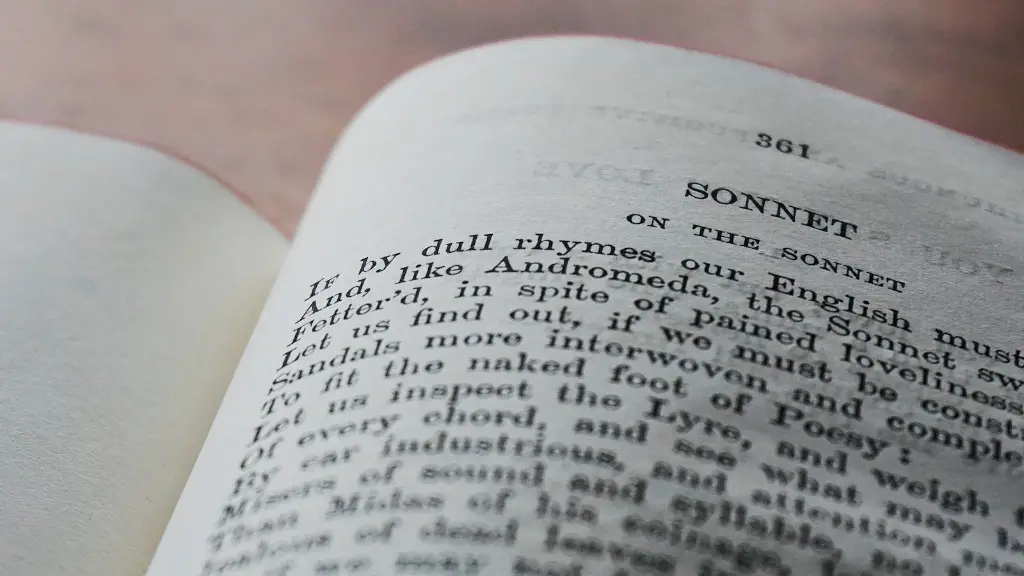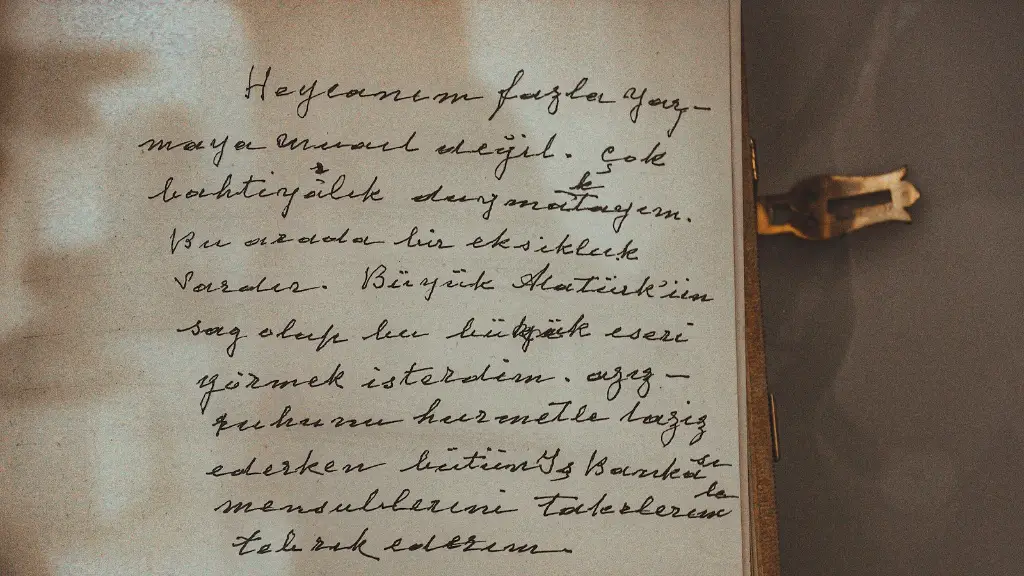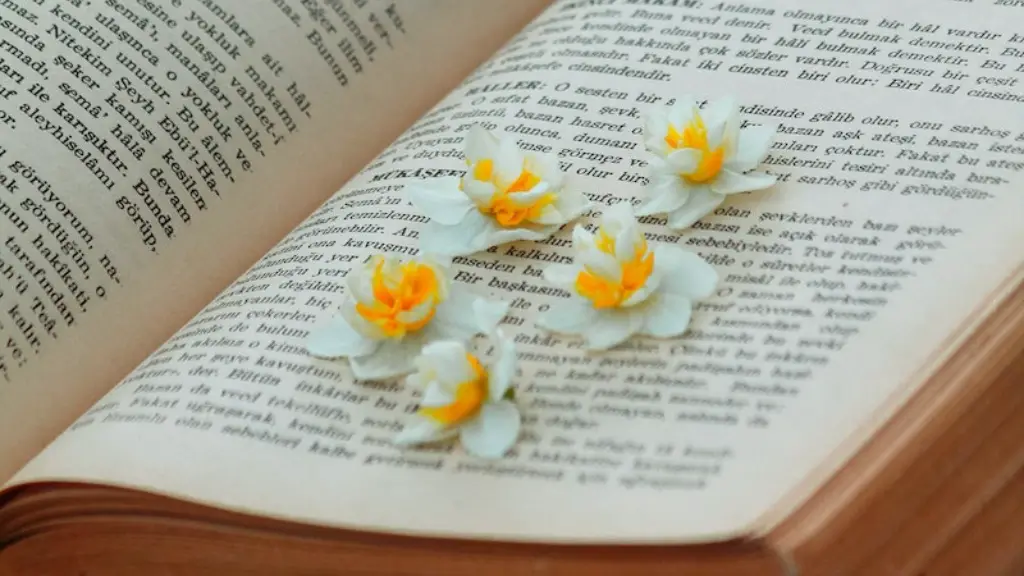1. The Power and Influence of Poetry
Poetry has long been beloved by readers and writers all over the world. It has the potential to express a wide range of emotions, topics, and ideas in a concise and beautiful way. Through its memorable rhymes, meter, and imagery, poetry can energize and inspire, capture a profound moment in time, tell stories, and create a space for reflection and contemplation. It also offers creative writer the freedom to experiment with language, as well as push the boundaries of traditional forms.
Poetry can help readers understand, compare, and appreciate different cultures and beliefs. Great poets can tap into imagery and story telling both rooted in their local tradition, and also universally recognizable. Poetry speaks to common themes of love, loss, beauty, identity, and belonging, all within a few words or lines, while allowing us to feel a connection to people across time, space, and cultures.
2. Different Types of Poetry
Different types of poetry can take the form of narrative, free-verse, haiku, sonnets, and much more. It is often discussed in terms of meter and rhyme schemes, but the emotional impact of the words is equally as powerful. Poets who are especially adept in their craft can use subtle nuances in their work to provoke a range of emotions and ideas. Whether creating a narrative about a specific event, or establishing a shared connection between people and cultures, great poets use their words to capture the human experience in a powerful way.
Many of the most popular poets from across history have used their words to bring awareness to societal injustices, to speak out against prejudice and unequal power dynamics, or to spread messages of hope and the resilience of the human spirit. Through the lens of poetry, poets have been able to bring attention to topics such as poverty, inequality, and a range of different social issues in a way that resonates with readers.
3. Poetic Experiences
Even beyond reading a poem aloud or writing a piece of verse, there are many ways to experience and appreciate poetry. Participating in a ‘poetry slam’ is a great way to explore how words and storytelling can be used to interpret and discuss different topics. Attendees can enjoy an evening of powerful performances and lyrical exploration in a variety of different styles. It’s also a great way to build community among like minded people who enjoy the power of words and story telling.
Another great way to explore the art form is through a series of creative writing workshops. Participants can learn the basics of crafting a poem and complete a variety of different activities to learn how to create thoughtful, engaging content. Going into a group setting with peers to discuss and interpret various themes and styles of poetry can be a great way to build a deeper appreciation for the craft.
4. The Art of Interpretation
When reading and discussing poetry, the viewer’s interpretation and the many meanings a poet conveys are often just as important as the words themselves. It is up to the reader to determine their own interpretation, as no two readers can experience a poem in exactly the same way. The subtleties and arguments within different works can leave readers with a lot to ponder and consider, no matter the length of the poem.
While some classic works may use language that might seem outdated to the modern reader, revisiting these works can be a great way to explore different perspectives and understand the different contexts and cultures in which they were written. With some context and a closer look, the reader can inject new life into these pieces and draw in unexpected elements that can make them shine.
5. Poetry as a Creative Outlet
One of the great benefits of poetry is how accessible it is for any writer; creating poems doesn’t require any extensive knowledge or experience of creating literature. All it takes is the desire to put pen to paper and start expressing yourself. Even if you don’t classify yourself as a ‘poet’, the craft can be an incredibly rewarding and healing experience. Writing a poem doesn’t have to be intimidating or require the kind of conventionally accepted structure and meter as many of the classic works; it can be whatever you make of it. Give yourself permission to let go and craft something personal and therapeutic.
Poetry provides a creative outlet that is both challenging and inspiring; a way to work through conflicted thoughts and emotion and to find healing in expression. With consistent practice and improvement, poets of all skill levels can continue to challenge themselves to explore complex topics with thought provoking language.
6. Mental Health Benefits Of Poetry
As with any form of creative writing, poetry can offer many mental health benefits. Writing down one’s experiences and feelings can be a powerful way to process emotions and experiences, helping to reduce stress and anxiety levels. Writing is also known to help relieve psychological conditions such as depression, PTSD, and OCD. Poetry can also be an effective tool for self-expression, reflective thinking, and cathartic release.
A 2017 study conducted by the University of Queensland found that expressive writing or ‘poetry therapy’ provided a formal platform to express emotions, a way to explore thoughts and feelings without judgement, and a platform to process trauma or major life events. For those suffering from serious mental health problems, therapy through poetry can provide a safe and non-confrontational way to explore their own feelings and find solace in words.
7. The Impact of Poetry On Our Lives
Poetry has the power to provide unique and deep perspectives on universal themes and provide an invaluable source of understanding and insight. Whether exploring poet’s work from different centuries or writing our own expression on a page, we can all appreciate the powerful and lasting impact poetry has had on our human experience.
Poetry also continues to shape our culture and its accompanying language; it’s no secret that some of our most beloved songs, stories, and modern day parables have their roots in the powerful impact of words and poetry. Throughout the ages, many great artists and poets have used their craft to express their thoughts and feelings, and influence public opinion to bring meaningful social and political change.
8. Promoting Poetry
In recent years, various programs and initiatives have been implemented to make poetry and literature more broadly accessible. Authors, poets, and professionals hold workshops, lectures, and readings in schools, libraries, and community centers in order to introduce more people to the art of writing. A variety of books and online resources also provide an extensive array of materials for anyone who’s interested in poetry.
Contests and poetry slams also offer a great way for artists to share their work with a larger audience and gain recognition for their talents and achievements. Mentorship programs can also give aspiring poets a platform to express themselves and connect with other writers to get valuable feedback on their work.
9. Education And Social Impact
Poetry amplifies the voice of the writer, and provides a platform to explore, debate, and reflect on issues of social and political importance. Poems and literature can help bring awareness to collective trauma, create a sense of belonging, and bring hope to the world. For example, in response to the Black Lives Matter movement, poets have written powerful works that examine the long and difficult history of oppression, racism, and violence experienced by the black community. By using poetry to explore difficult issues, they can help bring attention to them, as well as raise voices that can create positive change.
Poetry can also be a great way to educate and entertain readers. By bringing complex and difficult topics to life with words and stories, literature can be used to discuss a variety of themes and help readers gain further understanding and knowledge. In addition, poetry’s unique approach can be a great way to garner interest and enthusiasm in the study of language and literature, particularly in the classroom.
10. Understanding And Appreciating Poetry
With so many ways to experience and appreciate poetry, readers can find a way to connect and relate to it, regardless of their experience level. Even if you’re just starting out, give yourself permission to explore and discover new works and authors. Start a conversation with other readers or writers and begin to build and share meaningful connections.
Great poets have long understood the power of words, and the impact they can have. Understanding the tools and techniques that good poets use is essential for anyone interested in the craft. As you explore poetry, take the time to explore and appreciate the different techniques and styles that different authors have used to craft their works.
11. Creative Writing and Performance
Creative writing can be a great way to explore and express emotions. Poems can capture heartfelt and powerful experiences, and allow the writer to reveal unique perspectives and insights on life. Poets put their artistic skill and mastery of language on display, and craft stories and experiences that transport readers to a different world.
Performance can also be a great way to explore the art of poetry. As well as reading aloud, performers can use various props and gestures to bring their words to life and present a unique and captivating show. Seeing poetry come to life through performance can be an incredibly powerful experience and help to truly bring the words to life.
12. Writing A Poem
Before attempting to write a poem, it’s important to take some time to think and reflect. Consider what is important to you, as well as any past experiences or stories that you may want to share with readers. Think about the topic or experience you’d like to write about and what words or phrases would best capture its essence.
Begin to synthesize those ideas and memories, and consider which words best express what you’re thinking. Consider the structure of your poem and decide if you want to go for a more traditional rhyming and metered style, or a more free-form, stream of consciousness type of writing. Whatever your style, start to write and don’t let perfection stand in the way.
13. Appreciating The Craft Of Poetry
Appreciating the craft of poetry requires a deep understanding of the tools and techniques used to create works of art. Consider the rhythms, rhyme schemes, metaphors, stanzas, and syntax used by poets to convey powerful messages. Analyze not only the words, but also their unique structure, purpose, and intention.
Take the time to enjoy classical works, as well as modern works from lesser-known authors. As with any creative craft, it can take decades to understand the nuances and complexities of the art form, and to refine the craft. The more you explore the different styles, structures, and techniques, the more you will appreciate the truly artistry and power of poetry.
14. Connecting With Other Poets
Engaging with other writers and readers is a great way to learn and appreciate the powerful effects of poetry. Consider attending classes or workshop to interact with other writers, or seek out poets or books whose work resonates with you. You can join communities and discussion groups on social media apps or even start up a blog. This way, you can build relationships with like-minded writers and explore the craft together.
Social media apps such as Instagram, Twitter, and Facebook can also be a great platform to promote your work, or search for new writers. Expand your network by searching for interesting accounts and engaging with other poets. Regardless of your experience, you can always find new writers and perspectives to explore and connect with.



